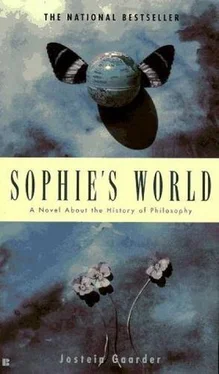Jostein Gaarder - Sophie's World - A Novel About the History of Philosophy
Здесь есть возможность читать онлайн «Jostein Gaarder - Sophie's World - A Novel About the History of Philosophy» весь текст электронной книги совершенно бесплатно (целиком полную версию без сокращений). В некоторых случаях можно слушать аудио, скачать через торрент в формате fb2 и присутствует краткое содержание. ISBN: , Издательство: BERKLEY BOOKS, NEW YORK, Жанр: Философия, на английском языке. Описание произведения, (предисловие) а так же отзывы посетителей доступны на портале библиотеки ЛибКат.
- Название:Sophie's World: A Novel About the History of Philosophy
- Автор:
- Издательство:BERKLEY BOOKS, NEW YORK
- Жанр:
- Год:неизвестен
- ISBN:0-425-15225-1
- Рейтинг книги:4 / 5. Голосов: 1
-
Избранное:Добавить в избранное
- Отзывы:
-
Ваша оценка:
- 80
- 1
- 2
- 3
- 4
- 5
Sophie's World: A Novel About the History of Philosophy: краткое содержание, описание и аннотация
Предлагаем к чтению аннотацию, описание, краткое содержание или предисловие (зависит от того, что написал сам автор книги «Sophie's World: A Novel About the History of Philosophy»). Если вы не нашли необходимую информацию о книге — напишите в комментариях, мы постараемся отыскать её.
Sophie's World: A Novel About the History of Philosophy — читать онлайн бесплатно полную книгу (весь текст) целиком
Ниже представлен текст книги, разбитый по страницам. Система сохранения места последней прочитанной страницы, позволяет с удобством читать онлайн бесплатно книгу «Sophie's World: A Novel About the History of Philosophy», без необходимости каждый раз заново искать на чём Вы остановились. Поставьте закладку, и сможете в любой момент перейти на страницу, на которой закончили чтение.
Интервал:
Закладка:
P.S. As far as the white rabbit is concerned, it might be better to compare it with the whole universe. We who live here are microscopic insects existing deep down in the rabbit’s fur. But philosophers are always trying to climb up the fine hairs of the fur in order to stare right into the magician’s eyes.
Are you still there, Sophie? To be continued . . .
Sophie was completely exhausted. Still there? She could not even remember if she had taken the time to breathe while she read.
Who had brought this letter? It couldn’t be the same person who had sent the birthday card to Hilde Moller Knag because that card had both a stamp and a postmark. The brown envelope had been delivered by hand to the mailbox exactly like the two white ones.
Sophie looked at her watch. It was a quarter to three. Her mother would not be home from work for over two hours.
Sophie crawled out into the garden again and ran to the mailbox. Perhaps there was another letter.
She found one more brown envelope with her name on it. This time she looked all around but there was nobody in sight. Sophie ran to the edge of the woods and looked down the path.
No one was there. Suddenly she thought she heard a twig snap deep in the woods. But she was not completely sure, and anyway it would be pointless to chase after someone who was determined to get away.
Sophie let herself into the house. She ran upstairs to her room and took out a big cookie tin full of pretty stones. She emptied the stones onto the floor and put both large envelopes into the tin. Then she hurried out into the garden again, holding the tin securely with both hands. Before she went she put some food out for Sherekan.
“Kitty, kitty, kitty!”
Once back in the den she opened the second brown envelope and drew out the new typewritten pages. She began to read.
A STRANGE CREATURE
Hello again! As you see, this short course in philosophy will come in handy-sized portions. Here are a few more introductory remarks:
Did I say that the only thing we require to be good philosophers is the faculty of wonder? If I did not, I say it now: THE ONLY THING WE REQUIRE TO BE GOOD PHILOSOPHERS IS THE FACULTY OF WONDER.
Babies have this faculty. That is not surprising. After a few short months in the womb they slip out into a brand-new reality. But as they grow up the faculty of wonder seems to diminish. Why is this? Do you know?
If a newborn baby could talk, it would probably say something about what an extraordinary world it had come into. We see how it looks around and reaches out in curiosity to everything it sees.
As words are gradually acquired, the child looks up and says “Bow-wow” every time it sees a dog. It jumps up and down in its stroller, waving its arms: “Bow-wow! Bow-wow!” We who are older and wiser may feel somewhat exhausted by the child’s enthusiasm. “All right, all right, it’s a bow-wow,” we say, unimpressed. “Please sit still.” We are not enthralled. We have seen a dog before.
This rapturous performance may repeat itself hundreds of times before the child learns to pass a dog without going crazy. Or an elephant, or a hippopotamus. But long before the child learns to talk properly—and Ion before it learns to think philosophically—the world we have become a habit.
A pity, if you ask me.
My concern is that you do not grow up to be one of those people who take the world for granted, Sophie dear. So just to make sure, we are going to do a couple of experiments in thought before we begin on the course itself.
Imagine that one day you are out for a walk in the woods. Suddenly you see a small spaceship on the path in front of you. A tiny Martian climbs out of the spaceship and stands on the ground looking up at you . . .
What would you think? Never mind, it’s not important. But have you ever given any thought to the fact that you are a Martian yourself?
It is obviously unlikely that you will ever stumble upon a creature from another planet. We do not even know that there is life on other planets. But you might stumble upon yourself one day. You might suddenly stop short and see yourself in a completely new light. On just such a walk in the woods.
I am an extraordinary being, you think. I am a mysterious creature.
You feel as if you are waking from an enchanted slumber. Who am I? you ask. You know that you are stumbling around on a planet in the universe. But what is the universe?
If you discover yourself in this manner you will have discovered something as mysterious as the Martian we just mentioned. You will not only have seen a being from outer space. You will feel deep down that you are yourself an extraordinary being.
Do you follow me, Sophie? Let’s do another experiment in thought:
One morning, Mom, Dad, and little Thomas, aged two or three, are having breakfast in the kitchen. After a while Mom gets up and goes over to the kitchen sink, and Dad—yes, Dad—flies up and floats around under the ceiling while Thomas sits watching. What do you think Thomas says? Perhaps he points up at his father and says: “Daddy’s flying!” Thomas will certainly be astonished, but then he very often is. Dad does so many strange things that this business of a little flight over the breakfast table makes no difference to him. Every day Dad shaves with a funny machine, sometimes he climbs onto the roof and turns the TV aerial—or else he sticks his head under the hood of the car and comes up black in the face.
Now it’s Mom’s turn. She hears what Thomas says and turns around abruptly. How do you think she reacts to the sight of Dad floating nonchalantly over the kitchen table?
She drops the jam jar on the floor and screams with fright. She may even need medical attention once Dad has returned respectably to his chair. (He should have learned better table manners by now!) Why do you think Thomas and his mother react so differently?
It all has to do with habit. (Note this!) Mom has learned that people cannot fly. Thomas has not. He still isn’t certain what you can and cannot do in this world.
But what about the world itself, Sophie? Do you think it can do what it does? The world is also floating in space.
Sadly it is not only the force of gravity we get used to as we grow up. The world itself becomes a habit in no time at all. It seems as if in the process of growing up we lose the ability to wonder about the world. And in doing so, we lose something central—something philosophers try to restore. For somewhere inside ourselves, something tells us that life is a huge mystery. This is something we once experienced, long before we learned to think the thought.
To be more precise: Although philosophical questions concern us all, we do not all become philosophers. For various reasons most people get so caught up in everyday affairs that their astonishment at the world gets pushed into the background. (They crawl deep into the rabbit’s fur, snuggle down comfortably, and stay there for the rest of their lives.)
To children, the world and everything in it is new, something that gives rise to astonishment. It is not like that for adults. Most adults accept the world as a matter of course.
This is precisely where philosophers are a notable exception. A philosopher never gets quite used to the world. To him or her, the world continues to seem a bit unreasonable—bewildering, even enigmatic. Philosophers and small children thus have an important faculty in common. You might say that throughout his life a philosopher remains as thin-skinned as a child.
So now you must choose, Sophie. Are you a child who has not yet become world-weary? Or are you a philosopher who will vow never to become so?
If you just shake your head, not recognizing yourself as either a child or a philosopher, then you have gotten so used to the world that it no longer astonishes you. Watch out! You are on thin ice. And this is why you are receiving this course in philosophy, just in case. I will not allow you, of all people, to join the ranks of the apathetic and the indifferent. I want you to have an inquiring mind.
Читать дальшеИнтервал:
Закладка:
Похожие книги на «Sophie's World: A Novel About the History of Philosophy»
Представляем Вашему вниманию похожие книги на «Sophie's World: A Novel About the History of Philosophy» списком для выбора. Мы отобрали схожую по названию и смыслу литературу в надежде предоставить читателям больше вариантов отыскать новые, интересные, ещё непрочитанные произведения.
Обсуждение, отзывы о книге «Sophie's World: A Novel About the History of Philosophy» и просто собственные мнения читателей. Оставьте ваши комментарии, напишите, что Вы думаете о произведении, его смысле или главных героях. Укажите что конкретно понравилось, а что нет, и почему Вы так считаете.












